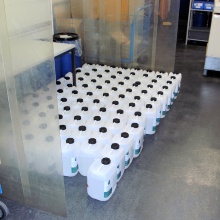The corona crisis produced a huge demand for sanitizer which has yet to die down. Therefore, on 11 March the Rectorate asked the Faculty of Chemistry if it could switch to producing sanitizer. This request was forwarded to the Institute of Organic Chemistry, which has the necessary source materials as well as a modern filing station in its chemicals dispensary. Since a decentralized production had been permitted following a general ruling by the Federal Institute of Occupational Safety and Health and simple formulae had been published, this request was answered in the affirmative. During the preparatory work for supplying the university, an urgent request was received on 19 March from the Association of Statutory Health Insurance Physicians in the state of Baden-Württemberg for sanitizer to use in the newly-created fever ambulances and emergency medical care, which was no longer available on the market.
In order to relieve the bottleneck, the Faculty of Chemistry at the University of Stuttgart worked for and alongside the Association of Statutory Health Insurance Physicians of Baden-Württemberg and with the active supervision of chemists to produce large quantities of urgently-needed hand sanitizer. This required working with due care and attention regarding the quality of the source materials.
Hands can be sanitized hygienically and small surfaces can be sanitized using alcoholic solutions which are relatively easy to manufacture, providing that source materials of sufficient purity are available as well as filling capacities and qualified staff. The SARS-CoV-2 virus can reliably be inactivated using alcoholic solutions containing 70% isopropanol or ethanol. The existing stocks of both alcohols were checked using high-resolution spectroscopy, and precleaned water was prepared using sterile filtration. The 5-liter canisters as typically used in medical practices were largely provided by the Safety Department of the University of Stuttgart. The production process was monitored by a pharmacist, who took responsibility for proceedings. A pharmacologist from the Association of Statutory Health Insurance Physicians played an active role in the production. Between 20 March and mid-April, the chemicals dispensary team and other staff from the Institute of Organic Chemistry produced almost 2500 liters of sanitizer based on the WHO’s formula, which was then supplied to the Association of Statutory Health Insurance Physicians. This meant that the Association of Statutory Health Insurance Physicians was able to support medical treatment during a critical phase of the coronavirus crisis via its temporary logistics center in Reutlingen.
Prof. Clements Richert has written an article on his experience of producing the sanitizer which has been published in the specialist journal Angewandte Chemie (Applied Chemistry).[i]
After the market for sanitizers began to recover, the focus then turned to the preparations for reopening the testing facility at the University of Stuttgart. In coordination with the Rectorate, the Safety Department and the Occupational Medical and Health Services, more than 600 liters of surface sanitizer has since been supplied within the university. The SARS-CoV-2 hygiene concept issued by the University of Stuttgart on 7 May lays down regulations governing how it should be used. The surface sanitizer is based on an 80 percent ethanol solution.
The University also believes that it is sufficiently prepared for any future demand for sanitizer.
[i] T. Opatz, J. Senn‐Bilfinger, Clemens Richert* Thoughts on What Chemists Can Contribute to Fighting SARS‐CoV‐2 – A Short Note on Hand Sanitizers, Drug Candidates and Outreach, Angewandte Chemie 24 April 2020, https://doi.org/10.1002/anie.202004721
About the Faculty of Chemistry at the University of Stuttgart
The Faculty of Chemistry at the University of Stuttgart is home to more than 250 scientists, including 24 professors, as well as more than 900 students from all fields of chemistry and materials science. Alongside the core disciplines of chemistry – inorganic, organic and physical chemistry – there are also institutes of Technical Chemistry, Biochemistry, Food Chemistry, Theoretical Chemistry, Polymer Chemistry and Materials Science.
Additional information:
[i]Thoughts on What Chemists Can Contribute to Fighting SARS‐CoV‐2 – A Short Note on Hand Sanitizers, Drug Candidates and Outreach
Kontakt:
Prof. Clemens Richert, University of Stuttgart, Institute of Organic Chemistry, tel. 0711/685-64311,
e-mail: lehrstuhl-2 (at) oc.uni-stuttgart.de
Susanne Schupp, University of Stuttgart, University Communications, tel. +49 (0) 711 /685 -82211,
e-mail: hkom@hkom.uni-stuttgart.de.


